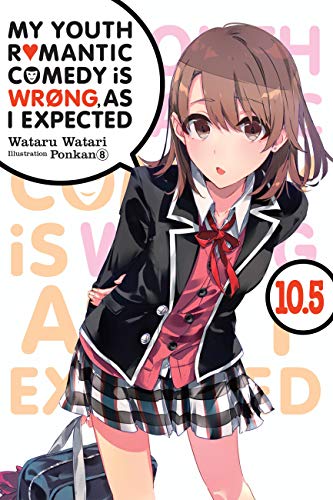By Wataru Watari and Ponkan 8. Released in Japan as “Yahari Ore no Seishun Rabukome wa Machigatte Iru” by Gagaga Bunko. Released in North America by Yen On. Translated by Jennifer Ward.
Generally speaking, you can’t rely on the cover art of a light novel series to tell you who’s important in that particular volume. This especially goes for romcoms, where it tends to alternate between the heroines regardless of whether they have a presence in the book. This volume of Oregairu, though, is an exception. If you’re here for Yui, expect disappointment. If you’re here for Yukino, you’ll get one really nice scene and that’s about it. No, most of this book, as the cover indicates, is about the next generation of the series. Our heroes are in their third year, talking about preparatory schools and discussing which colleges to apply to. Their mentor has moved to a new school and isn’t even mentioned in the post-ending story. This it’s up to the new generation to decide what the service club is going to be in the future: Komachi (who is a member) and Iroha (who isn’t, but might as well be). Unfortunately, they don’t seem to care.
The book consists of five stories, but only the final one is new to Japanese readers. The first two were Blu-Ray extras, and feature Komachi trying to decide who will be the best “big sister” for her – i.e., who will Hachiman end up paired up with? This takes place before the end of the series, so as you can imagine the answers are mostly comedic. We then get an adaptation of a CD drama, as Hachiman and his sister go to a music festival and run into Iroha, Yukino, Yui, and Tobe (their gofer and bodyguard). This has the most “Hachiman” narration of the book. A fourth story (written for a collaborative project) involves Iroha’s birthday, and her odd but comfortable relationship with Hachiman. Finally, we get a story set after the events of the final book, which is mostly about Hachiman worrying over his sister’s future at school.
I’ve talked a lot before about how I think the relationship between Hachiman and Komachi is one of the best written brother-sister relationships in light novels, and that continues to be true. He has to reluctantly accept that his sister is a lot more socially adept than he is, and thus her classroom life is fine. But they all have to deal with the elephant in the room, which is that Komachi joined the service club to be with her brother, Yukino, and Yui, and they’re going to have to leave it by the summer to gear up for college exams. The one bit of Hachiman/Yukino romance we get is set in a cafe near a college he’s visiting, and is (for this series) syrupy sweet, as Yukino has learned to take Hachiman’s realistic asides and roll with them, and they both have learned to accept actual affection. Just. As for Yui, she plans to go to prep school with Hachiman, but honestly, she gets the short end of the stick here. In other words, just like the series overall.
And so this series has now come to a close. I can confidently say there was not a single time in this volume I wanted Hachiman to shut the hell up, which shows how much he’s grown as a person. Fans of the series should enjoy this slight but heartwarming epilogue.














